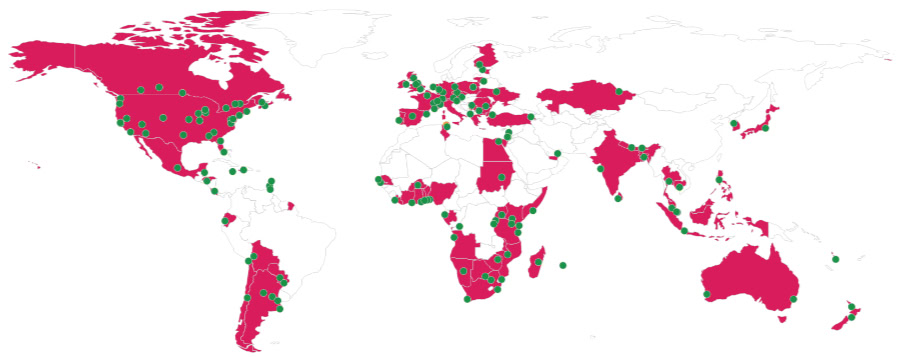What Is Quad9 DNS? Privacy Meets Cyber Threat Protection

The internet is a vast and dynamic space, but it isn’t without its share of risks. Cybercriminals constantly exploit vulnerabilities, spreading malware, phishing schemes, and other malicious content.
Quad9 DNS offers a powerful solution for individuals and organizations looking to enhance their security and protect their online activities. As a nonprofit, Quad9 goes beyond traditional DNS services by integrating real-time threat intelligence from leading cybersecurity partners to block harmful domains before they reach your devices.
With a global network of servers, encryption protocols, and strict privacy policies, Quad9 prioritizes security and trust, all while being completely free. If you’re searching for a reliable DNS resolver that safeguards your data and respects your privacy, Quad9 might just be the answer.
Core Functionality and Architecture
Quad9 DNS is a unique service that combines speed, security, and privacy to deliver an enhanced experience for resolving domain names. By leveraging cutting-edge technology and global infrastructure, Quad9 stands apart as a powerful alternative to traditional DNS provided by Internet Service Providers (ISPs).
Its robust architecture not only ensures faster connections but also actively blocks access to dangerous sites, helping safeguard users from cyberthreats.
DNS Resolution Basics
Every time you visit a website, send an email, or stream content, your device relies on the Domain Name System (DNS) to translate human-readable domain names, like www.example.com, into numerical IP addresses needed for network communication. Quad9 acts as a recursive DNS resolver, searching for and retrieving the IP address of a requested domain on behalf of your device.
Unlike DNS services offered by ISPs, Quad9 does not simply resolve domain names. It incorporates advanced layers of threat filtering, ensuring malicious and suspicious sites are blocked before a connection is established.
This capability enhances online security without requiring users to install additional software. Quad9’s recursive resolution process is seamless and requires no technical expertise to set up, making it accessible to individuals, businesses, and large organizations alike.
Infrastructure Design
Quad9’s infrastructure is built to prioritize speed, reliability, and global access. With more than 230 servers strategically distributed across 110 countries, the service minimizes latency and optimizes DNS queries.
Whether you’re accessing content in major hubs like New York, Tokyo, or Amsterdam, or remote regions with fewer DNS options, Quad9 ensures quick responses to your requests.
The service supports both IPv4 and IPv6 protocols, catering to traditional and modern internet configurations. Its flagship IPv4 address, 9.9.9.9, is simple to remember, while its IPv6 counterpart, 2620:fe::fe, offers compatibility with the growing adoption of newer internet address standards.
This infrastructure is backed by intelligent routing systems that utilize technologies like EDNS Client Subnet to improve query efficiency.
Quad9’s distributed design not only enhances performance but also provides resilience against cyberattacks. By spreading its operations across numerous servers and regions, it mitigates risks like Distributed Denial of Service (DDoS) attacks, ensuring uninterrupted access for users worldwide.
Threat Intelligence Integration
A standout feature of Quad9 is its integration of real-time threat intelligence, which transforms it from a conventional DNS resolver into a proactive security tool. Leveraging partnerships with more than 25 leading cybersecurity organizations, Quad9 continuously updates its database with information about malicious domains, phishing schemes, and botnet command-and-control servers.
Whenever a user attempts to access a domain flagged as harmful, Quad9 blocks the request by returning an NXDOMAIN (Non-Existent Domain) response. This prevents connections to unsafe websites and reduces the risk of malware infections, phishing attacks, and unauthorized data extraction.
The intelligence provided by Quad9’s global partners ensures that its threat detection remains timely and accurate.
The service also incorporates reputation scoring into its filtering mechanism to further improve reliability. By ranking domains based on their likelihood of being malicious, Quad9 minimizes the chances of false positives, ensuring legitimate content remains accessible.
This approach strikes an ideal balance between security and usability, making Quad9 DNS a versatile solution for users seeking enhanced protection without sacrificing convenience.
Security and Privacy Features

Quad9 DNS is designed with a strong focus on safeguarding users’ online activities by employing advanced security measures and stringent privacy policies. By encrypting DNS queries, preventing unauthorized data collection, and actively blocking malicious domains, Quad9 enhances both the safety and confidentiality of internet connections.
Its combination of cutting-edge protocols, ethical data practices, and proactive malware mitigation offers a secure browsing experience for users of all types, from individuals to enterprises.
Encryption Protocols
Encryption plays a vital role in protecting DNS queries from interception and tampering. Quad9 supports modern security protocols such as DNS over HTTPS (DoH) and DNS over TLS (DoT), ensuring that DNS queries are encrypted and shielded from prying eyes.
Traditional DNS queries are sent in plaintext, making them vulnerable to attackers or third parties seeking to monitor or manipulate web traffic. DoH and DoT address this gap by encrypting the communication between a user’s device and the Quad9 DNS servers.
Beyond encryption, Quad9 also employs DNSSEC (Domain Name System Security Extensions) to enhance the integrity of DNS responses. DNSSEC works by verifying the authenticity of DNS data, preventing attackers from redirecting users to fraudulent websites via DNS spoofing or cache poisoning.
These features collectively ensure that Quad9 not only resolves domains securely but also protects users from deceptive tactics that could compromise their internet experience.
Data Protection Policies
Privacy is central to Quad9’s mission as a nonprofit organization. Unlike many commercial DNS providers, Quad9 does not log individual IP addresses, ensuring that detailed user activity cannot be tracked or linked back to specific individuals.
While Quad9 does record general geolocation information, such as city, state, and country, this data is used exclusively for malicious campaign analysis and to support its threat intelligence partners in combating global cybersecurity threats.
Operating under Swiss jurisdiction further strengthens Quad9’s commitment to data protection, as Switzerland has some of the world’s most stringent privacy laws. By adhering to regulations comparable to the GDPR, Quad9 ensures compliance with internationally recognized standards for data security.
Users can trust that their DNS queries remain private, untracked, and free of commercial exploitation.
Malware Mitigation
Cybersecurity is a cornerstone of Quad9’s functionality, with its malware mitigation tools designed to protect users from harmful online threats. Whenever a user attempts to visit a domain identified as malicious, such as those associated with malware, phishing, or botnets, Quad9 intervenes by returning an NXDOMAIN (Non-Existent Domain) response.
This prevents the connection from being established, thereby stopping threats at their source.
To ensure accuracy, Quad9 relies on reputation scoring, which evaluates domains based on the likelihood of malicious activity. This system minimizes false positives, allowing legitimate websites to remain accessible while blocking harmful ones.
By filtering out dangerous content in real-time, Quad9 not only protects users from immediate risks but also contributes to broader efforts to maintain a safer internet ecosystem.
Benefits and Practical Applications

Quad9 DNS offers a host of benefits that go beyond traditional DNS services, making it an appealing option for individuals, businesses, and organizations worldwide. Its ability to combine robust security, high-speed connections, and ethical practices ensures users can safely access the internet without compromising their privacy.
With applications spanning a wide range of settings, Quad9 demonstrates its value in both personal and professional environments.
Advantages Over Traditional DNS
Traditional DNS services often lack the advanced features needed to address the modern challenges of internet security and performance. Quad9 elevates the DNS experience by filtering out malicious domains, ensuring users are protected from online threats such as malware, phishing, and botnet activity.
This layer of security is automatically applied, requiring no additional configuration or subscription fees, making it practical for users seeking effortless protection.
Performance is another significant advantage that Quad9 offers over standard DNS options. Through its implementation of EDNS Client Subnet (ECS) technology, Quad9 optimizes routing based on the user’s geographic location.
By shortening the path between the user and the servers hosting the requested domain, ECS enhances loading speeds and reduces latency. This makes the service suitable for everything from casual browsing to demanding activities like video streaming and online gaming, ensuring reliable performance across diverse use cases.
Additionally, Quad9’s nonprofit approach sets it apart from traditional DNS providers that often monetize user data. By refraining from tracking or selling personal information, Quad9 ensures an ethical and transparent relationship with its users, reinforcing its commitment to privacy.
Use Cases
Quad9 DNS is versatile, serving the needs of various users and environments. For home networks, it provides automated threat-blocking capabilities, shielding families and individuals from unsafe websites without requiring technical expertise.
Parents looking to enhance online safety or individuals seeking hassle-free protection will find Quad9 especially convenient.
In corporate settings, Quad9 acts as a scalable, zero-cost security solution for enterprises. Businesses can improve network hygiene and reduce the risk of malware infections by deploying Quad9 across their infrastructure.
Its compatibility with a wide range of devices ensures that it integrates seamlessly into diverse IT environments, saving both resources and time.
For IoT devices, Quad9 DNS is invaluable, as it ensures secure and encrypted DNS resolution on devices that often lack robust defense mechanisms. Smart appliances, security cameras, and other connected devices can benefit from Quad9’s encryption protocols, mitigating risks associated with IoT vulnerabilities.
The combination of security and simplicity makes Quad9 a practical choice for safeguarding connected systems in homes and businesses alike.
Accessibility
Quad9’s impact extends globally, prioritizing accessibility for all users regardless of region or socioeconomic status. Its free service is available to anyone with an internet connection, ensuring that underserved or remote areas are not excluded from advanced DNS protection.
Deployments in developing countries validate its commitment to equitable access, allowing users worldwide to enjoy safer internet experiences.
As a nonprofit organization, Quad9 operates without profit-driven motives, avoiding practices like monetizing user data for advertising or creating tiered subscription plans. This model ensures consistent service quality without hidden costs or compromises related to privacy.
By focusing on the public good, Quad9 fosters trust and extends cybersecurity benefits to those who might otherwise lack the resources for premium solutions.
How to Use Quad9 on Your Devices
Setting up Quad9 DNS is straightforward and can be done on a wide range of devices and routers. By manually configuring your DNS settings, you can instantly benefit from Quad9’s enhanced security and privacy features.
The steps are simple and require no advanced technical knowledge.
Computers
For Windows:
- Open your Control Panel and select Network and Internet, then Network and Sharing Center.
- Click Change adapter settings on the left-hand menu.
- Right-click your active network connection and select Properties.
- Highlight Internet Protocol Version 4 (IPv4) or Internet Protocol Version 6 (IPv6) and click Properties.
- Select Use the following DNS server addresses and enter Quad9’s DNS:
- IPv4: 9.9.9.9 and 149.112.112.112
- IPv6: 2620:fe::fe and 2620:fe::9
- Click OK to apply the changes.
For macOS:
- Open System Preferences and select Network.
- Choose your active network connection and click Advanced.
- Navigate to the DNS tab.
- Click the + button to add Quad9’s DNS addresses:
- IPv4: 9.9.9.9 and 149.112.112.112
- IPv6: 2620:fe::fe and 2620:fe::9
- Click OK and Apply to save your changes.
Mobile Devices
For Android:
- Go to Settings and select Network & Internet.
- Tap your Wi-Fi network and choose Advanced settings or Modify network.
- Under IP settings, switch to Static.
- Enter Quad9’s DNS addresses into the DNS fields:
- IPv4: 9.9.9.9 and 149.112.112.112
For iOS:
- Open Settings, then navigate to Wi-Fi.
- Tap the i icon next to your connected network.
- Select Configure DNS, change to Manual, and add Quad9’s DNS addresses:
- IPv4: 9.9.9.9 and 149.112.112.112
- Save your configuration settings.
Routers
Setting up Quad9 DNS at the router level ensures all devices connected to your network automatically benefit from its protection. The process may vary depending on the router’s make and model, but most follow similar steps:
- Access the router’s admin interface by entering its IP address into your web browser (commonly 192.168.1.1).
- Log in using your admin credentials.
- Locate the DNS settings under Network or LAN settings.
- Enter Quad9’s DNS addresses as primary and secondary:
- IPv4: 9.9.9.9 and 149.112.112.112
- IPv6: 2620:fe::fe and 2620:fe::9
- Save the settings and reboot the router if necessary.
DNS-over-HTTPS (DoH)
DNS-over-HTTPS encrypts DNS queries within HTTPS requests, offering robust privacy across various platforms. Most modern browsers and operating systems support DoH as a built-in feature.
For Web Browsers:
- Google Chrome:
- Open Chrome and navigate to Settings > Privacy and Security > Security.
- Scroll to the Advanced settings section and enable Use secure DNS.
- Select Custom and enter Quad9’s DoH endpoint:
- https://dns.quad9.net/dns-query
- Mozilla Firefox:
- Open Firefox and go to Settings > General > Network Settings (scroll to the bottom).
- Under DNS-over-HTTPS, check Enable DNS-over-HTTPS.
- Select Custom and enter Quad9’s DoH endpoint:
- https://dns.quad9.net/dns-query
For Operating Systems:
- Windows 11:
- Open Settings, navigate to Network & Internet, and select Properties for your active connection.
- Under DNS settings, switch to Manual and enable IPv4 or IPv6.
- Add Quad9’s DNS addresses:
- IPv4: 9.9.9.9
- IPv6: 2620:fe::fe
- Set the Preferred DNS encryption to Encrypted only (DNS-over-HTTPS).
DNS-over-TLS (DoT)
DNS-over-TLS encrypts DNS queries using TLS (Transport Layer Security) and is often available on smartphones, computers, and routers that support advanced DNS configurations.
For Android Devices (10 and above):
- Open Settings > Network & Internet > Private DNS.
- Select Private DNS provider hostname.
- Enter Quad9’s DoT hostname:
- dns.quad9.net
- Save your changes to activate encrypted DNS resolution.
For Routers Supporting DoT:
- Access your router’s admin interface through its IP address (commonly 192.168.1.1).
- Navigate to advanced DNS settings and look for DNS-over-TLS options.
- Enter Quad9’s hostname:
- dns.quad9.net
- Save the configuration and restart the router for changes to take effect.
Limitations and Considerations

While Quad9 DNS offers substantial benefits in security, privacy, and accessibility, it may not suit every user or environment. Understanding its limitations and the challenges associated with its implementation helps set realistic expectations and provides clarity on when it may or may not be the optimal choice.
Potential Drawbacks
Quad9’s automatic blocking of malicious domains, while beneficial, can occasionally lead to confusion for non-technical users. When a requested domain is blocked due to being flagged as harmful, the user typically receives an NXDOMAIN response without detailed explanations.
This might leave users uncertain about the reason a site was deemed unsafe or unaware of alternative actions they could take. For users new to DNS filtering tools, the lack of transparency regarding blocked domains may feel restrictive.
Additionally, Quad9 relies heavily on threat intelligence provided by its network of cybersecurity partners. These third-party threat feeds are integral to Quad9’s ability to identify and block malicious sites, but dependence on them introduces potential challenges.
For instance, updates to the feeds may vary in speed or accuracy depending on the cybersecurity partner, which could impact the service’s effectiveness in blocking emerging threats. While the intelligence network is vast, this reliance can limit control over security updates and classifications.
Compatibility Challenges
Conflicts with local network policies or VPN configurations are another consideration when using Quad9 DNS. Some network environments may have firewalls, routing rules, or VPN setups that interfere with Quad9’s servers or protocols, potentially leading to blocked queries or reduced performance.
Users relying on corporate networks or specialized VPNs might need additional configuration steps to ensure seamless integration, which can be inconvenient for those seeking simplicity.
Quad9 also offers limited customization compared to enterprise-grade DNS solutions. Businesses or technical users looking for granular control over domain filtering, whitelisting, or advanced analytics may find Quad9 less flexible.
While its default blocking system is highly effective for general security, organizations requiring tailored DNS policies may need to look toward premium services that provide detailed management options.
Conclusion
Quad9 DNS stands out as a dependable and forward-thinking solution in the world of internet security. By combining advanced threat intelligence, strong privacy measures, and a global infrastructure, it successfully balances the need for security, accessibility, and ethical practices.
Whether blocking malicious domains, encrypting DNS queries, or operating under stringent Swiss data privacy laws, Quad9 delivers a comprehensive service without compromising user trust.
Its nonprofit approach further distinguishes it, offering high-quality protection and performance without monetizing user data or imposing fees. This makes it an ideal choice for individuals, families, enterprises, and underserved regions where access to secure DNS services might otherwise be limited.
For users seeking a free, transparent, and effective DNS resolver, Quad9 provides a compelling option that prioritizes both security and ethical values.


